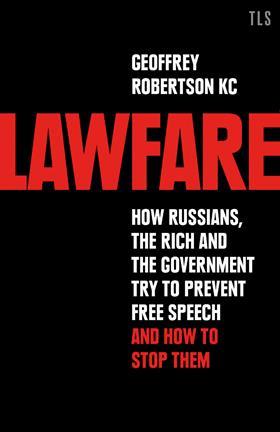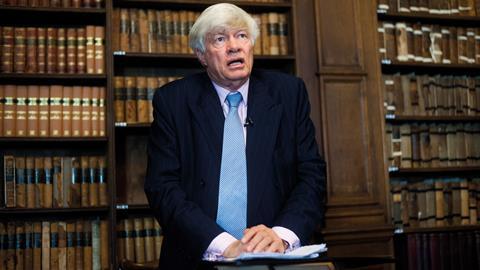Lawfare: How the Russians, the Rich and the Government Try to Prevent Free Speech and How to Stop Them
Geoffrey Robertson KC
£10.99, TLS Books
★★★★✩
An allegedly crooked businessman was being investigated for alleged corruption, but we cannot name him or his company. How has it come to this?
That is the question posed by Geoffrey Robertson KC’s concise book on proliferation of new privacy laws and SLAPP actions in the UK.
In Lawfare, Robertson (pictured) reacts to justice secretary Dominic Raab’s pledge to uphold the ‘quintessentially UK right’ of free speech by pointing out that Britain has a ‘wretched history and tradition when it comes to free speech’.
Robertson, the head of Doughty Street Chambers, writes that libel law was introduced in the 15th century as an alternative way of settling disputes. To encourage claimants to ‘hazard their money rather than their life’ at a time when great men of the realm were killing each other duelling, the burden of proving a defamatory allegation was placed on the defendant.

Robertson says this is the ‘ludicrous reason’ why the media still shoulders the burden of proving their claims in libel cases today.
This is particularly difficult in cases where journalists investigate the corrupt dealings of oligarchs in Putin’s Russia. Robertson recalls traipsing through the snow in Moscow’s Red Square, hunting for evidence to defend the Wall Street Journal against oligarch libel claims. He points out that, usually, the evidence to defend investigative journalism regarding events which took place abroad cannot be found.
This has led to shameful libel claims against the authors and publishers of books about oligarchs such as Putin’s People and Kleptopia. The burden of proof should be placed on claimants, as it is in the US, Robertson writes.
Robertson also argues that juries should be brought back in defamation trials to ‘help to draw lines about what is publicly acceptable’. However, he also includes multiple examples of cases in which juries awarded unjustifiable damages against media defendants, such as £85,000 to Liverpool goalkeeper Bruce Grobbelaar, an award which had to be overturned as ‘perverse’.
Further, while the book refers to the Johnny Depp libel cases, it does not touch on the spectacle into which the US case (featuring a jury) descended.
Robertson alternatively suggests ‘defendants should at least be entitled to elect for trial by jury’. This, unfortunately, could open the door for opportunistic defendants. Recently, quasi-politician Laurence Fox demanded the first libel trial by jury in a decade. He is being sued by three people he referred to as ‘paedophiles’ on Twitter. The book is silent on why public money should be spent indulging such defendants.
Charlie Moloney is a freelance journalist and consultant to media clients
Mr Perkins Takes Charge: A tale of a very superior cat
Suzanne Stephenson
£9.99, Mirador Publishing

What’s not to like about a novel featuring an enigmatic black cat and a group of hard-working lawyers? Suzanne Stephenson has written and illustrated this heartwarming tale (it really ought to be ‘tail’) of a judicious feline who befriends the partners and staff at the local office of ‘Spong, Salter and Tethering Solicitors’ and gently nudges them towards the right decisions in life.
The author’s admiration for the positive role that high street practices can play in their local communities is clear. She also champions the benefits that interacting with pets can bring for all sorts of people. There are likely to be many who would welcome the arrival of a ‘Mr Perkins’ in their office, although whether he would be quite so influential in a world of remote working and video conferencing is another matter.
David Philpott is a criminal defence solicitor at Olliers Solicitors, Manchester
































No comments yet